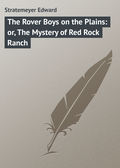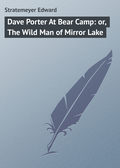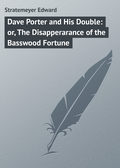
Stratemeyer Edward
Marching on Niagara: or, The Soldier Boys of the Old Frontier
CHAPTER XXI
ON THE WAY TO THE ARMY
Once inside the cabin, Mrs. Risley related her story in detail, to which the others paid the closest attention. Her trials had been great, and the quick tears of sympathy coursed down Mrs. Morris's cheeks as she listened, and the others were also affected.
"It was enough to kill you," said Mrs. Morris, at the conclusion. "But now you are back, safe and sound, we'll do our best by you. You can stay here until your husband builds another cabin and gets everything else into proper shape for living on your land." And so it was settled.
When Dave and Henry retired once more it was not to sleep but to talk in an undertone, the subject of the conversation being little Nell and the twins with her.
"I'm going to do what I can to rescue her," declared Henry. "It makes my blood boil to think of her being among those dirty redskins and French."
"I believe the best thing we can do is to join the army under General Prideaux," declared Dave. "His force will most likely go right through the Mohawk valley to Lake Ontario and then along the lake to Fort Niagara – just the territory where those Indians and French must be."
"I've got another idea," said Henry, after a thoughtful pause. "I got the news through White Buffalo. General Johnson has been commissioned to stir up the Indians in the Mohawk valley and get them to join in the attack on Fort Niagara. White Buffalo and his followers are going to join Johnson's force. Why not go with the white men in this crowd? We'll be sure to hear more about those Indians and the French traders in that way than if we went with the regular army."
"But to train with redskins, Henry!"
"We needn't train with 'em. There will be at least a dozen white men with the crowd and we can go with them. I once met General Johnson. He's a big-hearted Irishman, full of hard, common sense, and I know we could get along with him. And when he heard our story he might put himself out to help us."
So the youths talked on until at last they fell asleep – to dream of fierce fights with the French and Indians and daring rescues of little Nell. But these were only dreams. Little did they realize how many real difficulties and perils still awaited them.
In the morning Dave insisted upon talking the matter over with Sam Barringford. They found the old hunter ready enough to listen to what they had to say.
"I'm with ye!" he exclaimed, after they had finished. "It ain't no half bad plan nuther. I know Sir William Johnson like a book – fact is, I know him a heap sight better nor any book. As ye say, he's whole-souled and chock full of common sense. The Injuns love him as they love few white men – an' all because he's treated 'em fa'r and squar'. Why he's done more fer the English government nor any dozen Indian Commissioners put together. He knows jest how to handle 'em, an' he makes friends o' foes almost afore ye can turn a hand. Yes, let us go to him by all means and I'll warrant when ye tell him the whole story he'll set some Injuns out to find little Nell an' them Rose twins."
That afternoon the subject was brought to the attention of the whole family. Mrs. Morris did not know whether to be glad or sorry, but in the end she told the boys to go, but be careful and not run into unnecessary danger, and in private she asked Barringford to watch over them carefully.
"I'll do my level best, ma'am," said the frontiersman. "And ef I can make it, they'll come back to ye unharmed. But they're putty hot-like when they strike a trail as suits 'em, ye know thet as well as I."
Preparations were at once made for their departure. Both Dave and Henry were fitted out with new hunting suits of the regular trapper pattern and each took along the best gun he could obtain. Sam Barringford had bought another rifle, which he christened Old Trusty No. 2. They went on foot, not knowing if their progress with the whites and Indians would admit of riding on horseback.
In the meantime it was decided that James Morris should remain at the cabin, to finish the building and do the planting, thus giving his brother ample time to regain his health and strength, and also making it easier for Rodney, who during the past few weeks had been working harder than was good for his constitution.
"Good-bye, my son," said James Morris, when the trio was ready to start. "Be careful, but do not forget that we look to you to bring little Nell back, if such a thing is possible;" and then Mrs. Morris kissed the boys; and the long journey into what had been the Indian country was begun.
Dave felt somewhat sober so long as they were in sight of the newly built cabin, but when the last rise of ground was passed, and they had waved a parting farewell, to which Mrs. Morris had answered by a wave of her apron, his spirits returned, and soon he, Henry, and Barringford were chatting as though nothing out of the ordinary was occurring, yet down in his heart, each felt that this search for little Nell was going to prove a serious and, most likely, a dangerous undertaking.
"Where is Sir William Johnson now?" asked Dave, presently, after several miles of the trail through the forest had been covered.
"Somewhere near Fort Johnson," answered Barringford. "He's out to get the Six Nations to join General Prideaux's army either at Fort Stanwix or at Oswego – if Prideaux can get that far. Johnson is the very best man they could send to the Indians."
"Were you ever out with him?" asked Henry.
"Many a time, lad. He's a great hunter, too, let me tell you – can hit the bull's-eye at a hundred paces without half trying. And when it comes to dancing an Indian war dance he can do that, too."
"And yet he's an Irish nobleman!"
"Yes, I allow as how he's an odd mixture of a man. But that mixture makes him just the right kind for the redskins. He understands 'em – top, bottom and sides, as the saying goes. He appeals to their brains as well as their instincts – and when he once makes friends of 'em they are willing to lay down their lives for him. In 1756 he was appointed sole superintendent of the Six Nations Indians, and he made a perilous trip all the way to Onondaga, their capital, and staid with 'em two weeks, and got 'em to swear that they would remain neutral. That was a big feather in his cap. Then the next year he joined Webb at Fort Edward with some of his Indians, but he was too late to do anything, although I've heard he was more than willing to fight. He was also on hand to fight Montcalm when Abercrombie attacked Ticonderoga, but his three hundred Indians didn't see the use of being slaughtered in the open at mid-day and they refused to fight, although they told Johnson they would take part in the battle in their own way."
"It's queer the English soldiers can't fight as we do," said Henry. "I really can't understand it. They get out in the open and the Indian gets behind a tree, and who has the best of it? Certainly not the man in the open."
"I think the English soldiers have learned a lesson or two," said Dave. "I don't believe you'll find General Prideaux marching on Fort Niagara in the broad sunlight."
They were trailing through a dense forest, with trees on every side, lifting their heads a hundred feet and more to the sky. Gigantic roots lay sprawling on every side and they had to pick their way with care, for fear of pitching headlong or spraining an ankle. It was clear and moderately warm, and would have been warmer had the sunlight reached them.
"Years ago this was a great ground fer b'ar," said Barringford, as they rested for their noonday lunch, eating some things they had brought along from the cabin. "There war a cave 'bout two miles from here whar the b'ar ust to gather to the number of fifteen or twenty. But the cave was cleaned out so many times ain't likely to be any b'ar left."
"Shall we go near the cave?" questioned Dave. "I'd like to have a look at the spot."
"Yes, we'll go putty clost, lad. But you don't want to waste no time on game jest now, do ye?"
"Not unless it came very easy. If we got a bear it would give us some fine meat to take along, and we could sell the skin at Cherry Run."
"Ain't no b'ar there, I'm putty sure on it. But we can stop an' see – jest out o' curiosity sake."
They did not rest long, for they were anxious to join General Johnson at as early a date as possible, and knew that it would take them at least two weeks to make the trip. They were on rising ground, but soon they struck a downward path, filled with rough rocks and loose stones, where the footing was far from certain.
"The cave is over yonder," said Barringford, pointing with his hand. "The opening to it is on the other side. Come, I'll show ye the way. And have your guns ready – in case a b'ar should turn up."
After this no more was said, and they went forward, side by side – so that no one might hinder the aim of a companion. There was a slight undergrowth between the rocks but for the most part only tall trees, bare for a distance of thirty feet upward, marked the locality.
Suddenly Barringford put up his hand, to warn his companions. All came to a halt and listened, at the same time straining their eyes to see what might be ahead. They heard a low thump, followed by another, and then all became as silent as before.
"What was it?" at last whispered Dave.
"Some wild animal," returned Barringford, in an equally low tone. "Don't reckon as how it was a b'ar though."
They waited a moment longer, and then the old hunter again led the advance. There were several large rocks to cross and then they rounded one end of the cave, which, on top, was shaped very much like a huge rocky egg.
"A deer!" ejaculated Henry. "Look out!"
All looked and saw a magnificent deer standing close to the mouth of the cave, gazing cautiously forward. Suddenly a fox leaped out of the opening and the deer started back in alarm.
Bang! It was the report of Barringford's rifle and the deer leaped high in the air, to fall dead immediately afterward.
"A good shot – " began Henry, when a noise behind him caused him to swing around swiftly. What he saw filled him with horror. A huge buck was glaring at him from the opposite end of the rocky eminence. In a second more the buck charged the crowd, rushing forward with lowered antlers and with the swiftness of the wind.
CHAPTER XXII
THE FIGHT WITH THE BUCK
"Look out!"
These were the only words Henry had time to utter and as they left his lips he leaped to one side as swiftly as possible.
Hardly knowing what Henry meant, Dave and Barringford stood their ground, looking first one way and then another.
On the instant the big buck came forward. His rush was aimed at Henry, but missing that youth, he went onward with a wild plunge, directly between Dave and Barringford.
"A buck!" yelled the frontiersman. "Back out, Dave, an' be quick about it!"
He himself started on a run, reloading his rifle as he went. Dave wanted to do as bidden, but he had been so surprised that before he could turn his heel caught on a rock and down he went flat on his back. His gun struck on the trigger and went off, the charge tearing over the top of the cave into the tree branches beyond.
Dave was now helpless and if the truth must be told the fall had more than half dazed him, for his head came down on a spot that was far from soft and comfortable. More than this, with an empty gun he could do but little to defend himself.
The big buck had now come to a halt and turned around. He stood as if uncertain whether to renew the attack or take to his heels. Then he gazed at his mate and a strange red light shone in his angry eyes. He was "blood struck," as old hunters call it, and drawing in a sharp, hissing breath, he leaped forward once again, straight for Dave, who was now trying to rise.
Bang! It was now Henry's gun that spoke up, and though the aim was not of the best – for Henry was excited because Dave was in such dire peril – the buck was struck in the shoulder and badly wounded. He leaped back and into the air, and when he came down lifted his right foreleg as if in intense pain. But he was still full of fight and now he came on once more, with eyes glittering more dangerously than ever.
Dave had not time to rise, so he did the next best thing, which was to roll over and over, until a clump of brush stopped his further progress. Then he slipped into the brush, worming his way to the other side.
The big buck came on and struck the brush a stunning blow that sent the stalks and twigs flying in all directions. Then the animal backed out and started for Henry, who had begun to reload.
All this had happened faster than I can relate it, yet it had given Barringford sufficient time to throw powder and ball into his gun and fix the priming. Now the old hunter came close to the side of the buck and blazed away once more, straight for those reddish eyes.
The shot was a telling one, for it tore out one eye completely and seriously damaged the other. Again the buck halted, and then turned slowly back and began to stagger off. But he could not see and in a moment more hit the rocks of the cave with a crash that could be heard for a considerable distance.
"Good for you, Sam!" cried Henry, who was now reloading. "I reckon we've got him."
"Don't be too sure," returned the old hunter. "He's got lots of fight in him yet."
Barringford was right, for again the buck turned and now catching a glimpse of Barringford through the blood of his wounds made a mighty leap for the frontiersman. But Barringford was too quick for him and leaping aside, sprang on the rocks of the cave, satisfied the wounded buck could not follow him to that spot.
By this time Henry had reloaded, and watching his chance he ran up and let drive for the buck's neck. This shot proved fatal, and rocking to and fro for several seconds the magnificent beast at last fell down on his side, and breathed his last.
"Is he – he dead?" came from Dave, as he pulled himself out of the tangle of brushwood.
"I think he is," replied his cousin. "But we had better make sure. Bucks are mighty tricky at times."
Taking out his hunting knife Henry went forward and cut the throat of the game. Then Barringford leaped from the rocks, and all went to inspect the buck.
"A regular monarch of the forest!" cried Dave, enthusiastically. "Don't know as I've ever seen a larger."
"Nor I," added Barringford. "An' he was a fighter, too, wasn't he?"
"We've got more deer meat now than we know what to do with," went on Dave.
"We don't want the meat of this buck," said Henry. "It would be as tough as all get-out. We can take the skin and some of the meat from that deer, and that will be enough; don't you say so, Sam?"
"Right you are, lad."
All were experienced in the work at hand, so it did not take them long to skin both beasts and then the best of the deer meat was cut out by Barringford and rolled up in one of the pelts.
After this the march forward was again resumed.
That night they slept in the open, near a generous camp-fire, without being disturbed, and by sunrise were again on their way. They reached Cherry Run – a collection of half a dozen cabins – a little after noon, and here exchanged the skins and some of the meat for other things of more importance to them.
"There is a Dutch hunter here, who is going to join General Johnson," said the pioneer who gave them other things for their skins. "His name is Hans Schnitzer. Perhaps he'd like to go along with you – if you want him."
"What, old Dutch Hans, the beaver hunter!" exclaimed Barringford. "Why certainly I'd like him along. Thar's more fun in him nor in a barrel o' wasps. Whar is he?"
"He vos right here," came a voice from behind Barringford, and a short, stout individual stepped forward. His hair was red and his shock of a beard bore the same color. Above two sunburnt cheeks peeped two small eyes of blue, ever on a twinkle. He was dressed in the typical suit of the frontiersman of that day, buckskin leggings, coonskin cap and all.
"So you dinks dare vos more fun py me as mit von parrel of vasps, hey?" went on the Dutch trapper. "Vell, how apout dot dime ven you vos going to git dot pird's nest in der hollow dree und you stick your hand py dat vasps' nest, hey? Vosn't dot funny, hey? Ha! ha! ha! I see dot yet – mit you dancing arount like you vos a sailor on a pipe-horn, eh?"
"Gosh! don't mention it, Hans," returned Barringford, ruefully. "I kin feel them pesky wasps yet, fer they war the biggest I ever ran across. But put it thar, old boy, I'm downright glad to see you – an' after all the fightin' we've been a-havin', too. I suppose ye broke loose, didn't ye?"
"Vell I dinks me so," said Hans Schnitzer. "I vos up py dot Mohawk Valley, und I got me into nine fights by von veek vonce, und fourteen fights after dot." He removed his cap. "See dot mark? Dot is vere two Injuns tried to kill me – von mit a tomahawk und der udder mit his shcalpin' knife – dinking I vos dead. But I vasn't dead. I chumped up und ve rasselled und rasselled, und I got dem poth down ven, vot you dinks? – Cheneral Johnson himself come up – und dot vos der last of dose Injuns putty quick I can tole you."
"Good for the general," said Barringford. Then turning, he introduced Dave and Henry, and a general conversation ensued. The boys liked Hans Schnitzer from the start, and having often heard of the comical Dutch trapper, soon felt at home with him. Schnitzer knew exactly where Sir William Johnson's camp was located, and promised to take the party there by the shortest and easiest trail.
The party of four left Cherry Run early the next morning, each in the best of spirits, Schnitzer gaily humming a song of the Fatherland. The trail led almost due north, until a small stream was reached. Here, in a convenient spot, the Dutch trapper had a canoe secreted. This they entered and followed the stream for a distance of thirty miles, when they again struck out on foot, this time over the hills leading into the beautiful Mohawk Valley.
Day after day passed without anything unusual happening. Game was to be had in plenty, and it often made Henry heart-sick to leave it behind without taking a shot.
"A regular Paradise!" he said. "When this war is over, how I would like to come up here and knock around for a few weeks. I reckon I could make it well worth while."
"You'll find game just as plentiful at father's post on the Kinotah," answered Dave. "If father can ever get the post back, you must make a trip out there with me."
Ever since leaving home Dave had wanted to see a bear, and one day, just before the sun was setting, his wish was gratified. But the game was too far away for shooting, and before they could get closer the bear took to his heels and went crashing out of sight in the brushwood.
"Never mind, lad, we'll go b'ar huntin' another day," said Barringford, consolingly. "Jest fer the present, we have other ground ter plough, as the sayin' goes."
At the end of ten days the journey began to grow tiresome to the boys, and they were glad when Schnitzer announced that another day would more than likely bring them in sight of General Johnson's camp.
That night they encamped on the bank of the Mohawk, in an ideal spot covered with brush and some timber. All were thoroughly tired, for the day's tramp had been a long one, and Dave and Henry were glad when preparations for supper were at an end and there was nothing more to do than to eat and go to sleep.
It had been a clear day, but with the coming of night, the sky had clouded over, showing that a storm was not far off, although neither Barringford nor Hans the trapper thought it would rain before morning.
"Put ven it does come, I dink me it vos come hardt," said Schnitzer. "Maype it vos rain for two or fife days, eh?"
"Oh, I hope it doesn't rain as long as that!" cried Dave. "Why, we'll be drowned out."
The wood was piled on the fire, and a little later all lay down to rest, and it did not take Henry and Dave long to reach the land of dreams. They lay on one side of the cheerful blaze while the two men lay on the other. The wind was blowing the smoke from the fire directly across the river, so this did not bother them.
Dave had been asleep three hours when he suddenly awoke and gave a cough. Thinking that he was in danger of being smothered by the smoke he sat up and gazed at the fire. The wind had shifted slightly, but not enough to do any harm.
"No use of waking up the others," he thought. "They need every bit of sleep they can get. That wood is about burnt out anyway, so there won't be much more smoke."
He was about to lie down again, when the snapping of some brushwood behind him caught his ear. Turning he caught sight of an Indian crouching in the bushes gazing at him. Then came a noise from another direction and four other redmen glided into view. All were armed with guns, and at once Dave realized that the camp was surrounded.







